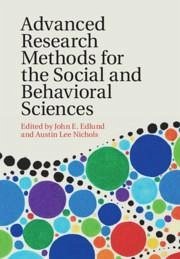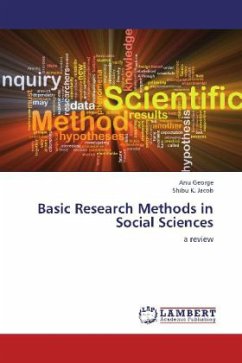Advanced Research Methods for the Social and Behavioral Sciences
Herausgeber: Edlund, John E; Nichols, Austin Lee
Advanced Research Methods for the Social and Behavioral Sciences
Herausgeber: Edlund, John E; Nichols, Austin Lee
- Gebundenes Buch
- Merkliste
- Auf die Merkliste
- Bewerten Bewerten
- Teilen
- Produkt teilen
- Produkterinnerung
- Produkterinnerung
Written by an interdisciplinary team of global experts, this book is an invaluable tool for anyone learning about research methods.
Andere Kunden interessierten sich auch für
![Combining Case Study Designs for Theory Building Combining Case Study Designs for Theory Building]() Lakshmi Balachandran NairCombining Case Study Designs for Theory Building85,99 €
Lakshmi Balachandran NairCombining Case Study Designs for Theory Building85,99 €![Pragmatism and Methodology Pragmatism and Methodology]() Alex GillespiePragmatism and Methodology80,99 €
Alex GillespiePragmatism and Methodology80,99 €![Developmental Evaluation Exemplars Developmental Evaluation Exemplars]() Developmental Evaluation Exemplars83,99 €
Developmental Evaluation Exemplars83,99 €![Basic Research Methods in Social Sciences Basic Research Methods in Social Sciences]() Anu GeorgeBasic Research Methods in Social Sciences32,99 €
Anu GeorgeBasic Research Methods in Social Sciences32,99 €![Five Ways of Doing Qualitative Analysis Five Ways of Doing Qualitative Analysis]() Frederick J WertzFive Ways of Doing Qualitative Analysis91,99 €
Frederick J WertzFive Ways of Doing Qualitative Analysis91,99 €![Writing Literature Reviews Writing Literature Reviews]() Jose L GalvanWriting Literature Reviews222,99 €
Jose L GalvanWriting Literature Reviews222,99 €![Important Scientific References of Articles Important Scientific References of Articles]() Sadeq Al YaariImportant Scientific References of Articles55,99 €
Sadeq Al YaariImportant Scientific References of Articles55,99 €-
-
-
Written by an interdisciplinary team of global experts, this book is an invaluable tool for anyone learning about research methods.
Produktdetails
- Produktdetails
- Verlag: Cambridge University Press
- Seitenzahl: 386
- Erscheinungstermin: 14. März 2019
- Englisch
- Abmessung: 259mm x 236mm x 20mm
- Gewicht: 953g
- ISBN-13: 9781108425933
- ISBN-10: 1108425933
- Artikelnr.: 54605752
- Herstellerkennzeichnung
- Libri GmbH
- Europaallee 1
- 36244 Bad Hersfeld
- gpsr@libri.de
- Verlag: Cambridge University Press
- Seitenzahl: 386
- Erscheinungstermin: 14. März 2019
- Englisch
- Abmessung: 259mm x 236mm x 20mm
- Gewicht: 953g
- ISBN-13: 9781108425933
- ISBN-10: 1108425933
- Artikelnr.: 54605752
- Herstellerkennzeichnung
- Libri GmbH
- Europaallee 1
- 36244 Bad Hersfeld
- gpsr@libri.de
List of figures; List of tables; List of contributors; 1. A brief
orientation to research methods and statistics for the social and
behavioral sciences John E. Edlund and Austin Lee Nichols; Part I.
Performing Good Research: 2. Reliability and validity of measurement in the
social and behavioral sciences Michael F. Wagner and John J. Skowronski; 3.
Performing research in the laboratory Austin Lee Nichols and John E.
Edlund; 4. Field research Sinikka Elliott; 5. Using the internet for
research Rosanna E. Guadagno; Part II. Understanding Issues Present
throughout the Research Process: 6. Issues in informed consent David S.
Festinger, Karen L. Dugosh, Esther Choi and Chloe Sierka; 7. Participant
preknowledge and attitudes in research Elena C. Papanastasiou; 8.
Experimenter effects David B. Strohmetz; 9. Suspicion probes and debriefing
in the social and behavioral sciences Ginette C. Blackhart and Travis D.
Clark; Part III. The Social and Behavioral Scientist's Toolkit: 10.
Physiological measures Eric J. Vanman and Michael C. Philipp; 11.
Eyetracking research Jeff B. Pelz; 12. Questionnaire design Heather M.
Stassen and Heather J. Carmack; 13. Reaction time measures in the social
and behavioral sciences: speed matters Jeremy D. Heider and Jason T. Reed;
Part IV. Emerging Issues in Social and Behavioral Science Research: 14.
Replications and the social and behavioural sciences Courtney K. Soderberg
and Timothy M. Errington; 15. Research ethics for the social and behavioral
sciences Ignacio Ferrero and Javier Pinto; 16. Interdisciplinary research
Rachel Adams Goertel, James P. Goertel and Mary G. Carey; 17.
Cross-cultural research Fons J. R. van de Vijver; Part V. New Statistical
Trends in the Social and Behavioral Sciences: 18. A gentle introduction to
Bayesian statistics Milica Miöevi¿ and Rens van de Schoot; 19. Development
and applications of item response theory Clifford E. Hauenstein and Susan
E. Embretson; 20. Social network analysis Sebastian Leon Schorch and Eric
Quintane; 21. Meta analysis: an introduction Gregory D. Webster; Appendix
A: Metafor package R code for meta-analysis examples; Index.
orientation to research methods and statistics for the social and
behavioral sciences John E. Edlund and Austin Lee Nichols; Part I.
Performing Good Research: 2. Reliability and validity of measurement in the
social and behavioral sciences Michael F. Wagner and John J. Skowronski; 3.
Performing research in the laboratory Austin Lee Nichols and John E.
Edlund; 4. Field research Sinikka Elliott; 5. Using the internet for
research Rosanna E. Guadagno; Part II. Understanding Issues Present
throughout the Research Process: 6. Issues in informed consent David S.
Festinger, Karen L. Dugosh, Esther Choi and Chloe Sierka; 7. Participant
preknowledge and attitudes in research Elena C. Papanastasiou; 8.
Experimenter effects David B. Strohmetz; 9. Suspicion probes and debriefing
in the social and behavioral sciences Ginette C. Blackhart and Travis D.
Clark; Part III. The Social and Behavioral Scientist's Toolkit: 10.
Physiological measures Eric J. Vanman and Michael C. Philipp; 11.
Eyetracking research Jeff B. Pelz; 12. Questionnaire design Heather M.
Stassen and Heather J. Carmack; 13. Reaction time measures in the social
and behavioral sciences: speed matters Jeremy D. Heider and Jason T. Reed;
Part IV. Emerging Issues in Social and Behavioral Science Research: 14.
Replications and the social and behavioural sciences Courtney K. Soderberg
and Timothy M. Errington; 15. Research ethics for the social and behavioral
sciences Ignacio Ferrero and Javier Pinto; 16. Interdisciplinary research
Rachel Adams Goertel, James P. Goertel and Mary G. Carey; 17.
Cross-cultural research Fons J. R. van de Vijver; Part V. New Statistical
Trends in the Social and Behavioral Sciences: 18. A gentle introduction to
Bayesian statistics Milica Miöevi¿ and Rens van de Schoot; 19. Development
and applications of item response theory Clifford E. Hauenstein and Susan
E. Embretson; 20. Social network analysis Sebastian Leon Schorch and Eric
Quintane; 21. Meta analysis: an introduction Gregory D. Webster; Appendix
A: Metafor package R code for meta-analysis examples; Index.
List of figures; List of tables; List of contributors; 1. A brief
orientation to research methods and statistics for the social and
behavioral sciences John E. Edlund and Austin Lee Nichols; Part I.
Performing Good Research: 2. Reliability and validity of measurement in the
social and behavioral sciences Michael F. Wagner and John J. Skowronski; 3.
Performing research in the laboratory Austin Lee Nichols and John E.
Edlund; 4. Field research Sinikka Elliott; 5. Using the internet for
research Rosanna E. Guadagno; Part II. Understanding Issues Present
throughout the Research Process: 6. Issues in informed consent David S.
Festinger, Karen L. Dugosh, Esther Choi and Chloe Sierka; 7. Participant
preknowledge and attitudes in research Elena C. Papanastasiou; 8.
Experimenter effects David B. Strohmetz; 9. Suspicion probes and debriefing
in the social and behavioral sciences Ginette C. Blackhart and Travis D.
Clark; Part III. The Social and Behavioral Scientist's Toolkit: 10.
Physiological measures Eric J. Vanman and Michael C. Philipp; 11.
Eyetracking research Jeff B. Pelz; 12. Questionnaire design Heather M.
Stassen and Heather J. Carmack; 13. Reaction time measures in the social
and behavioral sciences: speed matters Jeremy D. Heider and Jason T. Reed;
Part IV. Emerging Issues in Social and Behavioral Science Research: 14.
Replications and the social and behavioural sciences Courtney K. Soderberg
and Timothy M. Errington; 15. Research ethics for the social and behavioral
sciences Ignacio Ferrero and Javier Pinto; 16. Interdisciplinary research
Rachel Adams Goertel, James P. Goertel and Mary G. Carey; 17.
Cross-cultural research Fons J. R. van de Vijver; Part V. New Statistical
Trends in the Social and Behavioral Sciences: 18. A gentle introduction to
Bayesian statistics Milica Miöevi¿ and Rens van de Schoot; 19. Development
and applications of item response theory Clifford E. Hauenstein and Susan
E. Embretson; 20. Social network analysis Sebastian Leon Schorch and Eric
Quintane; 21. Meta analysis: an introduction Gregory D. Webster; Appendix
A: Metafor package R code for meta-analysis examples; Index.
orientation to research methods and statistics for the social and
behavioral sciences John E. Edlund and Austin Lee Nichols; Part I.
Performing Good Research: 2. Reliability and validity of measurement in the
social and behavioral sciences Michael F. Wagner and John J. Skowronski; 3.
Performing research in the laboratory Austin Lee Nichols and John E.
Edlund; 4. Field research Sinikka Elliott; 5. Using the internet for
research Rosanna E. Guadagno; Part II. Understanding Issues Present
throughout the Research Process: 6. Issues in informed consent David S.
Festinger, Karen L. Dugosh, Esther Choi and Chloe Sierka; 7. Participant
preknowledge and attitudes in research Elena C. Papanastasiou; 8.
Experimenter effects David B. Strohmetz; 9. Suspicion probes and debriefing
in the social and behavioral sciences Ginette C. Blackhart and Travis D.
Clark; Part III. The Social and Behavioral Scientist's Toolkit: 10.
Physiological measures Eric J. Vanman and Michael C. Philipp; 11.
Eyetracking research Jeff B. Pelz; 12. Questionnaire design Heather M.
Stassen and Heather J. Carmack; 13. Reaction time measures in the social
and behavioral sciences: speed matters Jeremy D. Heider and Jason T. Reed;
Part IV. Emerging Issues in Social and Behavioral Science Research: 14.
Replications and the social and behavioural sciences Courtney K. Soderberg
and Timothy M. Errington; 15. Research ethics for the social and behavioral
sciences Ignacio Ferrero and Javier Pinto; 16. Interdisciplinary research
Rachel Adams Goertel, James P. Goertel and Mary G. Carey; 17.
Cross-cultural research Fons J. R. van de Vijver; Part V. New Statistical
Trends in the Social and Behavioral Sciences: 18. A gentle introduction to
Bayesian statistics Milica Miöevi¿ and Rens van de Schoot; 19. Development
and applications of item response theory Clifford E. Hauenstein and Susan
E. Embretson; 20. Social network analysis Sebastian Leon Schorch and Eric
Quintane; 21. Meta analysis: an introduction Gregory D. Webster; Appendix
A: Metafor package R code for meta-analysis examples; Index.








